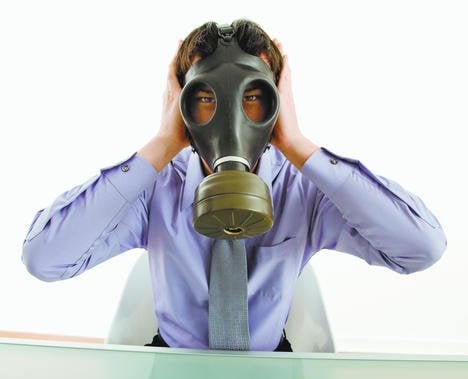
Q: Should I be worried about my office’s air quality?
A: By 3 pm on a draining day, you may be sick of working, but is your office literally making you ill? It all depends on what’s lurking around your cubicle (besides a sneezing colleague).
Fresh research from Boston University’s School of Public Health has found that workers in newly renovated buildings have way higher blood levels of PFCs (polyfluorinated compounds) like PFOA (used to make Teflon) from all the stain/water repellent finishes on carpets and furnishings (and even some paint).
New or old, the 30 offices tested in winter had PFC air readings on average three to five times higher than those generally found in our homes.
Not great news, considering that a study released last week in the Journal of the American Medical Association linked PFOA levels to weaker immune response in kids.
A few months back, the same researchers released a study on the persistent flame retardants lingering in office dust/worker bodies thanks to the sea of electronics surrounding most of us on the job.
In that case, the researchers issued clear advice: wash your hands more often. Those who did had lower blood levels of the dodgy flame retardants. (In totally unrelated news, they likely had fewer colds, too.)
But what do we do about stuff like stain repellants in the air? Tough one. Don’t count on getting your boss to rip up and toss out new carpets and chairs (though if your building is poised for reno, do recommend PFC-free carpeting like InterfaceFLOR carpet tiles).
If you’re concerned about air quality at work, your best strategy involves lobbying for a boost in your ventilation system’s air exchange – not to mention getting a few chem-absorbing houseplants for your desk. (Just don’t overwater them and trigger a mould problem.)
Actually, addressing poor ventilation gets to the root of the most common sources of worker headaches, malaise and more, according to pro indoor air tester Frank Haverkate (safeair.ca). Insufficient air exchange is easily remedied unfortunately, though, improving ventilation may cost your employer a little more in energy bills.
If the heating, ventilation and air con system’s been checked and balanced and people are still complaining, it’s probably time to call in a pro and have the air tested for everything including carbon monoxide and carbon dioxide problems, sewer gases, pollutants seeping into the vents from neighbouring buildings (like, say, an auto body shop), chemicals off-gassing from furnishings, and one of the biggest problems: mould spores.
You don’t have to work in an ancient, dilapidated building to have mould problems. Even brand new structures can have lingering water damage issues from the construction phase, and mouldy drywall is a pretty invisible problem (especially when it’s the back of the drywall that gets mouldy).
Speaking of which, if you thought the toxic Chinese drywall controversy didn’t touch this town, think again. Haverkate says he found some in a Toronto building just six months ago, though he’s tight-lipped about the location.
All this is to say that if you and your work buddies are contending with lingering health problems (from skin to respiratory issues) that seem to clear up a few hours after you get home every day, you’ve got the right to push for an air quality investigation. Since 2004, employers are criminally liable if they don’t provide you with a safe work environment, air quality included. Hence, some companies are getting air quality inspections done annually to make sure everything’s kosher.
Keep in mind that not every air quality investigation turns up anything wrong, even after expensive lab testing. Prioritize your concerns. Employers won’t do much about the flame retardants in the dust on older electronics, but mushrooms on your carpets should be a red alert.
And if renovations are in the plans, don’t forget to talk up the worker-friendly benefits of low or zero VOC flooring, office equipment, paints, furniture and more. (GreenGuard and EcoLogo certify ’em.)
Everyone will breathe easier in the long run.
Got a question?
Send your green queries to ecoholic@nowtoronto.com












